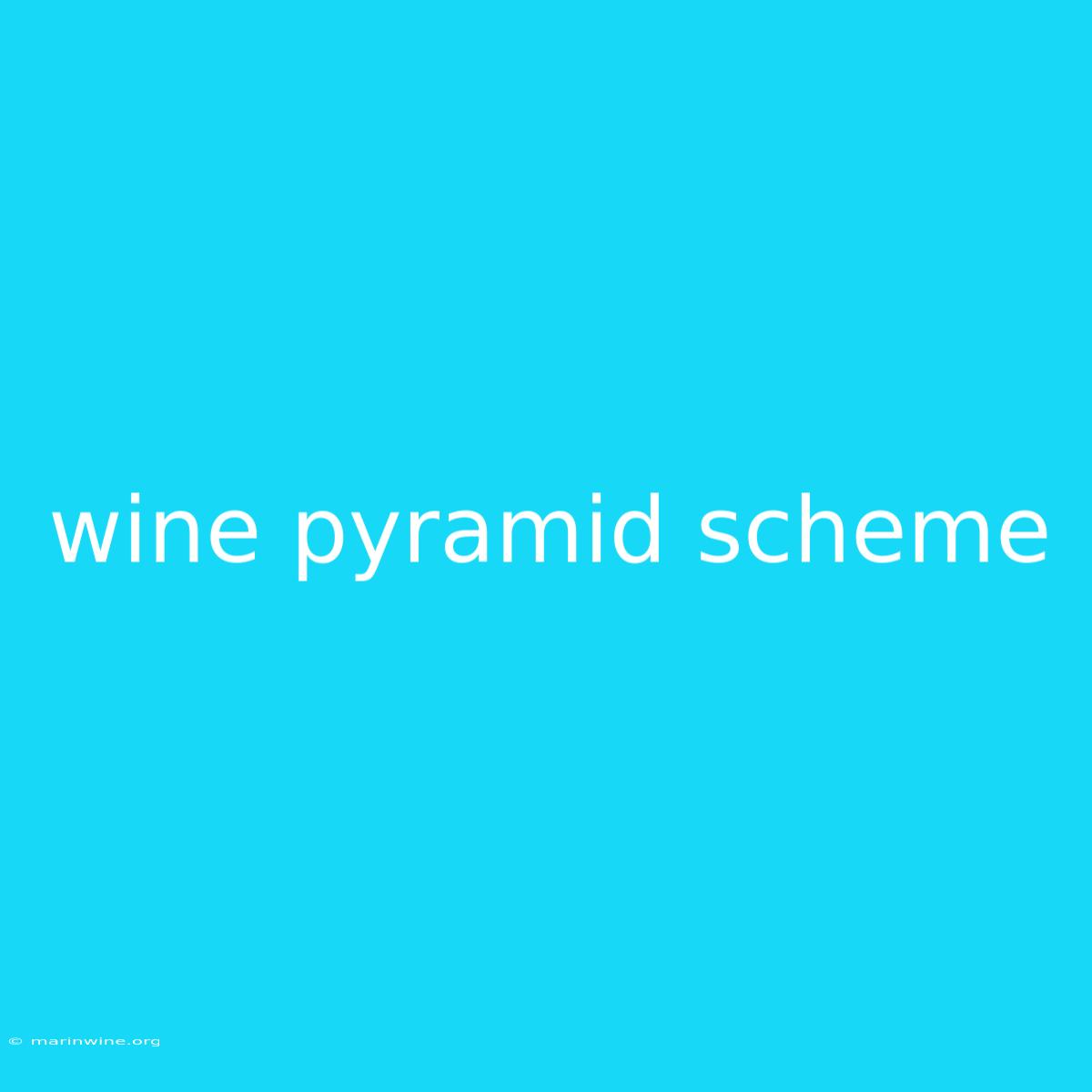Uncorking the Truth: The Wine Pyramid Scheme
Have you heard about a wine pyramid scheme promising incredible returns and luxury wine? It sounds tempting, but behind the glittering bottles lies a dangerous con. This article delves into the dark underbelly of this deceptive business model, exposing its flawed structure and the pitfalls waiting for unsuspecting participants.
Why It Matters: Wine pyramid schemes are on the rise, preying on individuals seeking financial gain or luxury experiences. Understanding the mechanics of these schemes is crucial for protecting yourself and others from falling victim to their deceptive promises.
Key Takeaways of Wine Pyramid Schemes:
| Feature | Description |
|---|---|
| Recruitment-Based: Participants primarily earn money by recruiting new members, not selling actual wine. | |
| Unsustainable Growth: The scheme relies on continuous recruitment, which is ultimately unsustainable. | |
| High Initial Investment: Participants often pay substantial upfront fees, putting their initial investment at risk. | |
| Promise of Luxury: Schemes often entice participants with the allure of luxurious wine and exclusive access. | |
| Legality Concerns: Pyramid schemes are often illegal, and participants risk losing their investment and facing legal penalties. |
Wine Pyramid Schemes: A Deeper Dive
What is a Wine Pyramid Scheme?
Wine pyramid schemes present themselves as multi-level marketing businesses offering a unique opportunity to profit from selling high-quality wines. However, the true focus lies in recruitment, not actual wine sales. New recruits are lured in by promises of high earnings and luxurious experiences. Participants are encouraged to invest in starter packages, typically including wine and marketing materials. They then earn money by recruiting new members who also invest, creating a pyramid structure where the highest earners are those who recruit the most people.
The Flawed Structure:
- Unsustainable Growth: The model relies on perpetual recruitment, which is inherently unsustainable. As the pyramid grows, it becomes increasingly difficult to find new recruits, eventually collapsing under its own weight.
- Limited Product Value: The actual wine sold is often overpriced and of questionable quality. The focus is on recruiting, not the product itself.
- Risk of Financial Loss: Participants are often required to invest a significant upfront sum, putting their money at risk if the scheme collapses.
- Unrealistic Expectations: The schemes often overpromise returns, creating unrealistic expectations and leaving participants disappointed and financially burdened.
The Dangers of Wine Pyramid Schemes
Financial Ruin: The collapse of a pyramid scheme can result in substantial financial losses for participants, particularly those at the bottom tiers who haven't yet recouped their initial investment.
Legal Consequences: Pyramid schemes are often illegal, with participants facing potential legal repercussions including fines and even jail time.
Emotional Distress: The realization that one has been tricked can lead to feelings of shame, anger, and frustration.
The Impact on the Wine Industry:
While not directly linked to legitimate wine producers, these schemes can damage the industry's reputation by associating luxury wines with deceptive practices.
Unmasking the Deception: Warning Signs of Wine Pyramid Schemes
- Focus on Recruitment: The emphasis is placed on bringing in new members rather than selling actual products.
- High Initial Investment: Participants are required to pay a substantial upfront fee, often for starter packages.
- Unrealistic Income Claims: Promises of quick riches and high returns should raise red flags.
- Emphasis on Exclusivity: Schemes may boast about access to high-quality wines and exclusive events.
- Lack of Transparency: Financial information and details about product sourcing are often vague or hidden.
FAQ
Q: How do I protect myself from a wine pyramid scheme?
A: Be wary of any business that relies heavily on recruitment and promises unrealistic returns. Do thorough research, check legitimacy with authorities, and avoid schemes that demand high upfront investments.
Q: Is it legal to participate in a wine pyramid scheme?
A: In most countries, pyramid schemes are illegal. Participation carries the risk of legal action and financial loss.
Q: What can I do if I'm caught in a wine pyramid scheme?
A: Contact authorities and seek legal advice. Document all interactions, payments, and promises made by the scheme operators.
Tips to Avoid Wine Pyramid Schemes
- Focus on Products, Not Recruitment: Be cautious of businesses that primarily promote recruiting new members instead of selling actual products.
- Understand the Business Model: Before joining, thoroughly understand how the company makes money and the role of recruitment.
- Avoid High Upfront Investments: Be wary of schemes that require substantial upfront fees, especially if they promise fast returns.
- Be Realistic About Income Potential: Avoid businesses that overpromise income, particularly if they lack a clear track record.
- Trust Your Gut: If something feels off or too good to be true, it probably is.
Summary of Wine Pyramid Schemes
Wine pyramid schemes are dangerous and deceptive business models that prey on individuals seeking financial gain or luxury experiences. These schemes often promote themselves as legitimate multi-level marketing businesses, but their true focus is on recruitment, not actual product sales. Understanding the warning signs and avoiding these schemes is crucial for protecting yourself and your finances.

